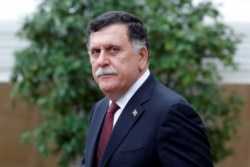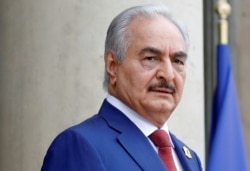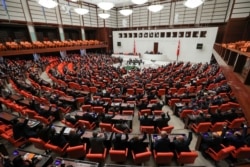Turkish President Recep Tayyip Erdogan is accusing Libyan militia leader General Khalifa Haftar of violating a cease-fire agreement. Despite deploying Turkish forces to back the Libyan Government of National Accord (GNA), though, Erdogan seems to be increasingly looking to diplomacy rather than force.
"He [Haftar] says he agreed to a cease-fire, but two days subsequent, he bombed the [Tripoli] airport. So how can we trust him?" Erdogan said Friday in Istanbul with German Chancellor Angela Merkel.
Haftar's forces control most of Libya in their war against the U.N.-recognized GNA.
Merkel on Sunday hosted an international summit in Berlin aimed at resolving the Libyan civil war. A 55-article road map to end the conflict was drawn up at the meeting, which Erdogan attended.
Erdogan challenged Merkel at the news conference, however, to confirm whether Haftar had signed the Berlin agreement. A visibly uncomfortable Merkel confirmed he only orally agreed to it, noting that officials were still waiting for his signature.
Support for Sarraj
Despite the Berlin agreement’s reaffirmation of the Libyan international arms embargo, the Turkish president said he would continue supporting the GNA's prime minister, Fayez al-Sarraj.
"We sent them a [military] delegation and continue to do so. We won't abandon Sarraj. We will give the support we can," Erdogan said.
"Our soldiers are there to assist in the training [of GNA forces]. We have a history of 500 years, and we have an invitation [from the GNA] that gives us our right," he added.
But Erdogan, several times during the news conference, said the forces were purely for training.
Earlier this week, Turkish Defense Minister Hulusi Aktar also stressed the training purpose of the Libyan deployment. The Turkish force reportedly still only numbers in the dozens.
The downplaying of the military deployment contrasts with Erdogan's recent sharp rhetoric. Last week, the Turkish president, while announcing to Parliament soldiers' deployment, said Ankara would not hesitate about "teaching a lesson" to Haftar if his forces continued attacking.
Fears of wider war
Such language reportedly has set off alarm bells in the region over fears that Turkish forces in Libya could end up triggering a wider regional conflict with Haftar's military backers, including Egypt.
Given that Libya is 2,000 kilometers from Turkey, though, a military expert questioned whether Ankara was capable of sustaining a hot conflict.
“The logistic challenge is enormous, and these challenges, as they look now, are insurmountable. It's far away. It's not like Syria is just across the border," said former Turkish General Haldun Solmazturk, a veteran of cross-border military operations.
"If fighting gets tough, casualties would be inevitable. Returning dead persons and wounded would also be a major challenge. Apart from the fuel, the ammunition, spare parts, there are thousands of items needed to be provided in such an environment," added Solmazturk, who heads the 21st Century Turkey Institute, an Ankara-based research organization.
Turkish forces are already stretched, being deployed in Iraq and Syria, while analysts point out Haftar is in a strong military position.
"At the moment the situation seems to be working on the side of Haftar. He has better weapons. He has jet fighters. He has superiority of the air and in the field," said international relations professor Huseyin Bagci of Ankara's Middle East Technical University.
Further complicating Ankara's situation is its international isolation over Libya's military deployment. Erdogan's shuttle diplomacy this month drew a blank, failing to win backing from Libya's neighbors, Algeria and Tunisia.
Erdogan also reportedly failed at the Berlin summit to secure backing for an international peacekeeping force, including the Turkish military, to be deployed to enforce a cease-fire in Libya.
Military challenges for Turkey
Analysts suggest Ankara's isolation only compounds the military challenges it faces in Libya. "The Mediterranean, in terms of naval transportation, is controlled by not too friendly forces. And neighboring countries Tunisia, Algeria and Italy are less than willing to help or to provide any logistic bases or any other logistic support. They seem determined to stay out of this," said Solmazturk.
"Libya threatens to be another Syria, where countless lives and many treasures will be wasted to defend a very ill-defined 'national objective,' " warned analyst Atilla Yesilada of GlobalSource Partners, an economic and security research group based in New York.
Erdogan appears increasingly to be looking to diplomacy in a bid to isolate Haftar. In a speech Thursday in the presence of Merkel, the Turkish president called for "pressure" to put on Haftar.
Erdogan challenged the international community over its courting of Haftar, despite the general’s failure so far to sign on to a cease-fire. "It doesn't make sense such support is continued," he said at Friday's news conference with Merkel, "if such a person is constantly so spoiled."
Migrant issue
The Turkish president also is seeking to play the migrant card against Europe, warning of "chaos" if Haftar remains unchecked.
Some analysts are warning, however, that Ankara needs to face the reality that the region has little appetite for a Turkish role in Libya.
"The region wants neither Turkey nor Russia seeking to extend its hegemony to Libya and the wider region. This is the reality," said Bagci.
But for now, Ankara is likely figuring on having a limited military presence in Libya while continuing to push for international deliberations on a resolution to Libya’s civil war and its future.







